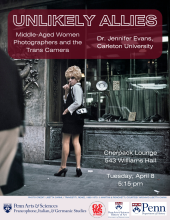This paper takes up the parallel lives of two Jewish middle-aged women photographers, one in Italy, the other in Brazil, and the role of their photographs of the Genoa and Sao Paolo trans scenes for the way they presaged the visibility politics of the gay, lesbian, and feminist social movements of the 1970s and 80s. Lisetta Carmi and Madalena Schwartz, refugees who fled the Nazis in the 1930s before working their way into photography late in life, built relationships of intimacy and trust with the trans sex workers and performers they photographed in Italy and Brazil. In the process, they created a new visual language and emotional register for how to think about gender non-conformism long before Robert Mapplethorpe or Nan Goldin turned the camera on their own worlds. Working in the shadow of neo fascism in Italy and dictatorship in Brazil, these stories of kinship and solidarity ask us to consider the connections between the afterlives of the Holocaust and the Sexual Revolution. They unveil new points of contact, new sources of trust and allyship, and new visual and emotional regimes of ethnography and truth telling in a moment of resurgent authoritarianism. Most compellingly, they cast light on new and different actors - on both sides of the lens - whose stories have been undervalued or perhaps, never been told, stories that are all the more vital for us today.
Jennifer Evans is Professor of European History at Carleton University in Ottawa Canada, where she teaches about the history of sexuality, photography, and memory. Her books include Life Among the Ruins: Cityscape and Sexuality in Cold War Berlin (2011) and The Queer Art of History: Queer Kinship After Fascism published in 2023 and recently awarded the German Studies Association Prize for Best Book in Literature and Cultural Studies. She has also co-written Holocaust Memory in the Digital Mediascape with former Carleton students Meghan Lundrigan and Erica Fagen. Her next book, Full Frontal: a New History of the Sexual Revolution, traces the role of image making in this period of social and legal change. In 2026, she will deliver the George Mosse lectures at the University of Wisconsin at Madison on the postwar history of German drag, which was funded by the Humboldt Foundation’s Adenauer Prize.

 The Program in Gender, Sexuality, and Women’s Studies
The Program in Gender, Sexuality, and Women’s Studies